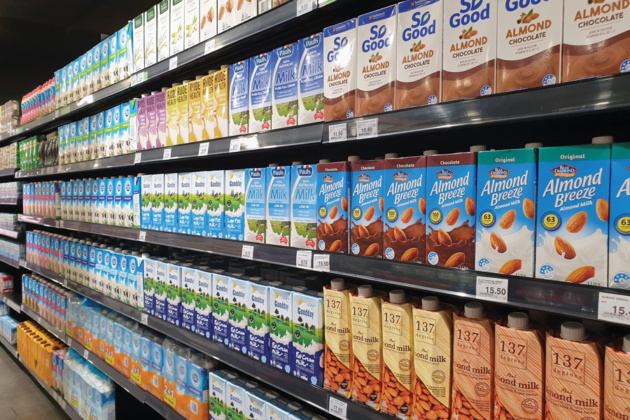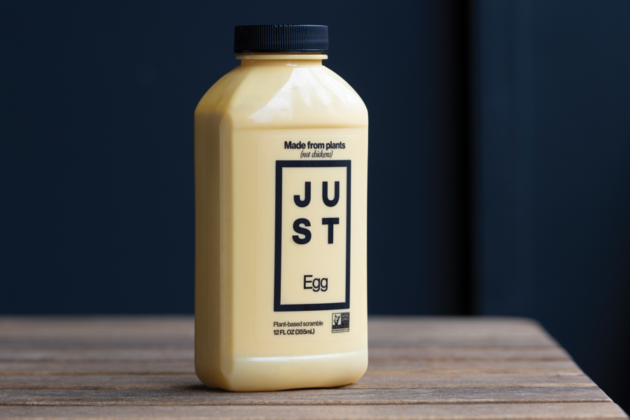
The great reset for plant-based foods
By Mark Juhasz
Food Trends Editor pick plant based foodsAlternative food companies must address the taste-texture expectation of consumers
 Plant-based food companies like Beyond Meat are seeing a big drop in sales. Photo © Andriy Blokhin / Adobe Stock
Plant-based food companies like Beyond Meat are seeing a big drop in sales. Photo © Andriy Blokhin / Adobe Stock This year we have seen a significant shift in stock valuations of large banner brands in animal and plant protein. Major U.S. food companies such as Tyson Foods and Pilgrim’s Pride (major suppliers of pork and poultry) have been relatively steady, while leading plant-based brands like Oatly, Beyond Meat and Impossible Foods, as well as the plant-based subsidiary of Canada’s Maple Leaf Foods, have experienced a significant drop in sales and revenue.
Acerbated by high food prices is a growing ‘trust gap’ among Americans in the food that is being grown, produced, and sold to them. Earlier this year, Beyond Meat faced a class action lawsuit about false claims and labelling misinformation.
Further, McDonald’s test pilot of the McPlant burger with Beyond Meat’s patties, and processed cheese, buns, and mayo was a failure. Some might argue fast food restaurant chains, such as McDonald’s, Burger King, and KFC, which are built on a history of low-priced meat may not be the best place for a plant-based alternative to gain traction. In October, Impossible Foods laid off six per cent of its staff. These developments have prompted food industry analysts to reassess the market size of meat alternatives, at least for the near future.
This is also the best time for ‘resetting’ the direction of innovation in the plant-based sector, and for companies to pay more attention to consumer expectations.
Value for money is critically important, as always. However, taste, texture and sensory pleasure do not take a back seat to moral and environmental signals in food choices. While we might be living in a very food-curious time, where people, especially millennials and Gen Z are open to trying new products, there won’t be a repeat purchase if the experience isn’t satisfying.

New plant-based formulations that address consumer needs for taste, texture, and nutrition are needed. Photo © ltyuan/ Adobe Stock
Adjusting the response
Some large plant-based brands are doubling down on production capacity to increase and improve their economies of scale and offer market prices at parity with meat and dairy products. Earlier this year, Just Egg claimed to have reached price parity for its 12-ounce bottle of plant-based liquid egg with a comparable 12-count egg carton. In the case of Just Egg, it has been able to deal with inflation by scaling up production. It recently acquired a 30,000-sf facility to produce mung bean protein isolate, the main source of its liquid egg substitute.
However, scaling up production to meet meat and dairy price parity is not the only priority for plant-based brands. The broader societal movement toward healthier eating and concern for immune boosting choices has accelerated since the pandemic. Whether it is ‘clean label’ or ‘natural’ ingredients, plant-based food companies are reformulating their products. Companies may be hitting a saturation point with burger patty and ground meat alternatives, but there are opportunities in jerky, seafoods, and ready-to-eat (RTE) meals. Indeed, Impossible Foods launched a line of frozen RTE meals in September. Evidence is strong the texture-taste-nutrition combination shouldn’t be compromised, especially for consumers motivated to purchase plant-based foods. It is also worth noting that consumers choosing plant-based foods are making healthy eating a cornerstone of their diets, which includes conventional meat.
To meet the challenge of taste, texture and nutrition, ingredient companies can create formulations that are able to function like and provide the taste and texture of meat and dairy products, while being as natural as possible. For example, a range of ingredients are coming out that use fermentation in everything from grains and mycoproteins to algae, microalgae, fungi, legumes-pulses, and bacterial cellulose that provide distinctly umami flavours. Through the applied science of fermentation, new textures, thickening, gelling, stabilizing, and water-holding capacity can be applied to the taste experience.

Just Egg claims to have achieved price parity for its plant-based liquid egg with chicken eggs. Photo © Tada Images / Adobe Stock
Sustainability
Under the significant groundswell of plant-based industry growth in products over the past decade, and its subsequent media, regulatory and cultural attention, it is worth noting the differences in response from European governments and their North American counterparts. In the EU, meat and dairy traditions have deep roots, and many of these cultural practices have specific production standards and designations (think British Stilton, Parma ham, or French Roquefort). There has been some concerted resistance in Europe to allowing emerging meat and dairy alternatives to call themselves ‘milk’, ‘meat’, ‘steak’ or ‘sausage’. This argument has not seemed to hold up in North American courts or via regulation.
The animal protein sector’s response to the rise of plant-based alternatives has been equally diverse and nuanced. There is a growing movement toward recognizing the food value chain’s importance to regenerative agriculture, which links soil health, farm and food system biodiversity, and integrated livestock as part of sustainable production practices. For example, Neutral Foods, became the first carbon-neutral dairy milk company in the U.S. It has received financing from prominent investors like Mark Cuban and Bill Gates’ Breakthrough Ventures. Neutral works with dairy farmers to reduce their carbon footprint by implementing emissions reduction strategies.
New directions
A 2021 study conducted by the Agri-food Analytics Lab at Dalhousie University (in partnership with Caddle data company) found 72 per cent of Canadians identify as having no dietary preferences (including being an omnivore and including meat in their diet), 5.7 per cent identify as vegetarian, and 4.5 per cent as a flexitarian (mostly a vegetarian with some meat and fish). Gen Z respondents were twice as likely to identify as vegetarians. What was also interesting from the survey of more than 10,000 Canadians was that about 20 per cent of all respondents in the 12 months between October 2020 and 2021 claimed to have consumed:
- more dairy products;
- more meat products, but also, and somewhat ironically;
- more plant-based meat/protein alternatives.
- In Canada, consumers are trying plant-based offerings, but the important market determinant is whether it becomes a repeat, or regular purchase.
Additionally, it could be argued that the broader socio-economic-environmental arc of history is a growing concern for personal health, animal welfare, and ecosystem sustainability. This will continue to have an important influence on consumer eating habits. It also means plant-based foods will have an increasing role to play in our diets along with meat, dairy, and seafood.
For the industry, though, the question is something very basic. As explained by the co-director of the Alt. Meat Lab at UC Berkeley, “Ultimately people’s taste buds lead them in a certain direction, but until they are informed or guided in that way, they won’t get there.” Overly complicated processing, labels, inadequate nutrition, a lack of format varieties and poor taste experiences deter interest and repeat purchase. The industry must address these challenges to gain consumer trust and market share.
Mark Juhasz is CEO and founder of Harvest Insights. He has more than 20 years of experience in the agri-food industry. He can be reached at www.harvestinsights.com.
This article was originally published in the November/December 2022 issue of Food in Canada.
Print this page